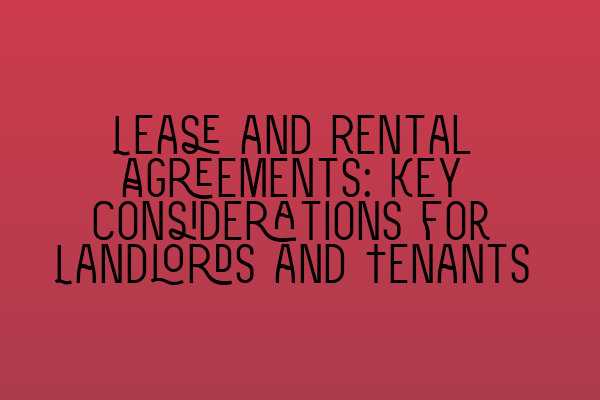Lease and Rental Agreements: Key Considerations for Landlords and Tenants
Introduction:
When it comes to leasing and rental agreements, both landlords and tenants must carefully consider various aspects to ensure a smooth and mutually beneficial arrangement. From understanding the legalities involved to outlining the responsibilities of each party, a well-drafted lease agreement is crucial. In this blog post, we will explore the key considerations that landlords and tenants should keep in mind when entering into a lease or rental agreement.
I. Understanding the Basics of Lease and Rental Agreements:
Before diving into the details, let’s start with a brief overview of what lease and rental agreements entail. A lease agreement is a legally binding contract between a landlord and a tenant, outlining the terms and conditions under which the tenant can occupy the property. On the other hand, a rental agreement is a more flexible arrangement that typically operates on a month-to-month basis. While both types of agreements govern the landlord-tenant relationship, lease agreements generally offer more long-term stability.
II. Key Considerations for Landlords:
1. Property Condition: Before leasing the property, landlords must ensure that it meets all legal requirements and is habitable for tenants. This includes maintaining essential amenities, addressing structural issues, and complying with safety regulations.
2. Written Agreement: It is essential for landlords to have a written lease or rental agreement that clearly states the terms and conditions of the tenancy. This helps prevent misunderstandings and provides a reference point for dispute resolution, if necessary.
3. Rent and Security Deposits: Landlords should establish a fair rental price based on market rates and highlight the due dates for rent payments. Additionally, they should clearly communicate the conditions for security deposits, including the amount, purpose, and circumstances under which it may be withheld.
4. Repairs and Maintenance: Landlords have an obligation to maintain the property and carry out necessary repairs. It is important for them to clearly define the responsibilities of both parties in the agreement, ensuring that tenants report any issues promptly and landlords address them in a timely manner.
5. Termination and Eviction: Landlords should outline the terms for termination of the lease agreement, including notice periods and procedures. In cases of non-compliance or breach of contract, they should also familiarize themselves with the legal process for eviction to protect their rights.
For more information on skills every solicitor should master, check out our related article on The Art of Contract Drafting and Negotiation: Skills Every Solicitor Should Master.
III. Key Considerations for Tenants:
1. Rental Application and Background Checks: Tenants should complete a rental application and authorize background checks to establish their credibility and financial stability. This helps landlords make informed decisions when selecting tenants.
2. Lease Review: Before signing a lease or rental agreement, tenants should carefully review all clauses and seek legal advice if necessary. Pay close attention to provisions regarding rent increases, repairs, maintenance, and termination rights.
3. Tenant Rights and Responsibilities: Understanding your rights and responsibilities as a tenant is crucial. Familiarize yourself with local laws concerning security deposits, privacy, eviction procedures, and the landlord’s obligation to maintain the property in a habitable condition.
4. Rent Payment and Insurance: Tenants must understand the payment terms and due dates specified in the agreement. It is also wise to consider purchasing renter’s insurance to protect personal belongings from damage or loss.
5. Communication with Landlord: Establishing clear channels of communication with the landlord is important throughout the tenancy period. Promptly report any maintenance issues or concerns, and keep all written correspondence for future reference.
For more information on essential skills for solicitors, check out our related article on Mastering Client Care Skills: Essential for Solicitors.
Conclusion:
Lease and rental agreements form the foundation of a landlord-tenant relationship, outlining rights, responsibilities, and expectations for both parties. By understanding the key considerations discussed in this blog post, landlords and tenants can establish a fair and mutually beneficial arrangement. Remember to seek legal advice when necessary and prioritize clear communication throughout the tenancy period.
For more helpful articles, please visit our blog:
– Mentorship for Aspiring Solicitors: Nurturing Talent in the Legal Field
– Exploring Alternative Dispute Resolution: An Effective Approach to Legal Conflicts
– The Art of Contract Drafting and Negotiation: Skills Every Solicitor Should Master
– Navigating the Legal Practice Course (LPC): Your Path to Solicitor Qualification
– Mastering Client Care Skills: Essential for Solicitors
